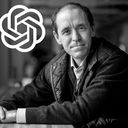Exclusive: OpenAI's Chris Lehane says AI is "critical infrastructure"

ChatGPT maker OpenAI wants you to see AI as the next "critical infrastructure" — and veteran political hand Chris Lehane is the firm's new face for this message.
Why it matters: OpenAI aims to showcase how its tech helps "everyday people" and can tackle big challenges in health care, education and climate, Lehane said.
- He spoke with Axios in an exclusive first interview in his new role at OpenAI as vice president of public works.
"My historical analogy here is the New Deal," Lehane told Axios. "It built out the bricks and mortar infrastructure that helped set up the U.S. to be the 'arsenal of democracy,' and helped make sure the industrial century translated into meaningful benefits for everyday folks."
Between the lines: Lehane is equating OpenAI's interests with America's — echoing the famous 1953 view of General Motors CEO Charles Wilson that "what was good for our country was good for General Motors, and vice versa."
- "People should want OpenAI to succeed, because they understand that if OpenAI succeeds, by definition, [democratic] societies succeed," Lehane said.
OpenAI is now "poised to be able to help the public sector design, develop and think about AI as a resource, and then translate it into critical infrastructure, and also for various commercial sectors to think about it that way," Lehane said.
- "The U.S. is one of arguably two countries in the world that can think about this infrastructure at scale. But there is a huge global element."
State of play: OpenAI is acknowledging that it needs more senior figures — beyond its high-profile CEO, Sam Altman — to engage with decision-makers and communities around the world.
- The shift from "AI is the new magic" to "AI is the new infrastructure" is also a reaction to the American public's increasing skepticism of Silicon Valley wizardry.
Catch up quick: Lehane has been consulting for OpenAI for around a year, and was at Altman's side during his ouster from OpenAI in November, helping him engineer his swift return to the role of CEO.
- Lehane is a former senior vice president of policy and communications at Airbnb and press secretary on Al Gore's 2000 presidential campaign.
- His most recent role was as chief strategy officer at Haun Ventures, a VC firm focused on cryptocurrencies.
Behind the scenes: Lehane will work closely with OpenAI vice president of global affairs Anna Makanju, who leads OpenAI's efforts to engage policymakers and who guided Altman through his successful first round of Washington, D.C. appearances in 2023.
- OpenAI executives believe November's leadership drama brought the company closer together. "It's very tightly collaborative," Makanju told Axios.
Reality check: While OpenAI executives were careful to use the phrase "critical infrastructure" rather than "public infrastructure," either way, this way of thinking about the technology is likely to spur greater demands for regulation or government control of its products.
What they're saying: "All of us need to begin to demonstrate how this is going to actually improve people's lives," Lehane said.
- Lehane sees his work as focused beyond elected officials: "My work will be with sort of the next circle of stakeholders and asking: How does this impact a classroom? How is this going to impact health care? How is this going to impact science?"
- "A lot of the work I did in Airbnb was having to educate different parts of the world about how a U.S. digital platform was impacting them in very real ways," he said, predicting that OpenAI will need a similar global effort to win people over on AI.
- Altman told Axios at the World Economic Forum in January that he expects major advances in the rate of scientific discovery thanks to AI.
OpenAI may be the world's most famous startup, but it still faces the kind of growing pains typical of firms that have struck a popular nerve.
- "There's still much more work than there are people to do it," Makanju said.
- "We're still really small. It is an all-hands-on-deck effort. Companies like Google have nearly 200,000 employees. They are literally 200 times bigger than us," she said.
What they're saying: "92% of Fortune 500 companies are using our tools and that's great, but how do we make sure that every NGO or government agency that's serving underserved populations can also provide services using these tools?" Makanju asked.
One fun thing: Lehane has two teenage children, "and they both independently said, 'Those folks are way too smart for you to be working with.'"